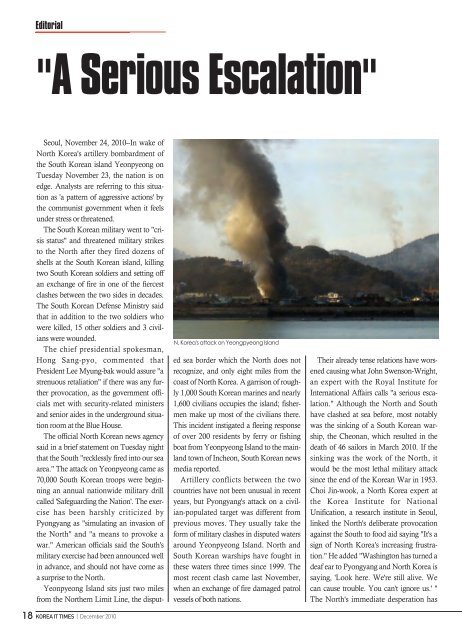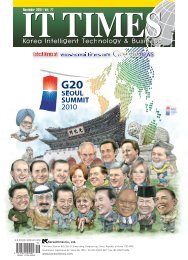Create successful ePaper yourself
Turn your PDF publications into a flip-book with our unique Google optimized e-Paper software.
Editorial<br />
"A Serious Escalation"<br />
18 KOREA <strong>IT</strong> TIMES | December 2010<br />
N. <strong>Korea</strong>'s attack on Yeongpyeong Island<br />
Seoul, November 24, 2010--In wake of<br />
North <strong>Korea</strong>'s artillery bombardment of<br />
the South <strong>Korea</strong>n island Yeonpyeong on<br />
Tuesday November 23, the nation is on<br />
edge. Analysts are referring to this situation<br />
as 'a pattern of aggressive actions' by<br />
the communist government when it feels<br />
under stress or threatened.<br />
The South <strong>Korea</strong>n military went to "crisis<br />
status" and threatened military strikes<br />
to the North after they fired dozens of<br />
shells at the South <strong>Korea</strong>n island, killing<br />
two South <strong>Korea</strong>n soldiers and setting off<br />
an exchange of fire in one of the fiercest<br />
clashes between the two sides in decades.<br />
The South <strong>Korea</strong>n Defense Ministry said<br />
that in addition to the two soldiers who<br />
were killed, 15 other soldiers and 3 civilians<br />
were wounded.<br />
The chief presidential spokesman,<br />
Hong Sang-pyo, commented that<br />
President Lee Myung-bak would assure "a<br />
strenuous retaliation" if there was any further<br />
provocation, as the government officials<br />
met with security-related ministers<br />
and senior aides in the underground situation<br />
room at the Blue House.<br />
The official North <strong>Korea</strong>n news agency<br />
said in a brief statement on Tuesday night<br />
that the South "recklessly fired into our sea<br />
area." The attack on Yeonpyeong came as<br />
70,000 South <strong>Korea</strong>n troops were beginning<br />
an annual nationwide military drill<br />
called 'Safeguarding the Nation'. The exercise<br />
has been harshly criticized by<br />
Pyongyang as "simulating an invasion of<br />
the North" and "a means to provoke a<br />
war." American officials said the South's<br />
military exercise had been announced well<br />
in advance, and should not have come as<br />
a surprise to the North.<br />
Yeonpyeong Island sits just two miles<br />
from the Northern Limit Line, the disputed<br />
sea border which the North does not<br />
recognize, and only eight miles from the<br />
coast of North <strong>Korea</strong>. A garrison of roughly<br />
1,000 South <strong>Korea</strong>n marines and nearly<br />
1,600 civilians occupies the island; fishermen<br />
make up most of the civilians there.<br />
This incident instigated a fleeing response<br />
of over 200 residents by ferry or fishing<br />
boat from Yeonpyeong Island to the mainland<br />
town of Incheon, South <strong>Korea</strong>n news<br />
media reported.<br />
Artillery conflicts between the two<br />
countries have not been unusual in recent<br />
years, but Pyongyang's attack on a civilian-populated<br />
target was different from<br />
previous moves. They usually take the<br />
form of military clashes in disputed waters<br />
around Yeonpyeong Island. North and<br />
South <strong>Korea</strong>n warships have fought in<br />
these waters three times since 1999. The<br />
most recent clash came last November,<br />
when an exchange of fire damaged patrol<br />
vessels of both nations.<br />
Their already tense relations have worsened<br />
causing what John Swenson-Wright,<br />
an expert with the Royal Institute for<br />
International Affairs calls "a serious escalation."<br />
Although the North and South<br />
have clashed at sea before, most notably<br />
was the sinking of a South <strong>Korea</strong>n warship,<br />
the Cheonan, which resulted in the<br />
death of 46 sailors in March 2010. If the<br />
sinking was the work of the North, it<br />
would be the most lethal military attack<br />
since the end of the <strong>Korea</strong>n War in 1953.<br />
Choi Jin-wook, a North <strong>Korea</strong> expert at<br />
the <strong>Korea</strong> Institute for National<br />
Unification, a research institute in Seoul,<br />
linked the North's deliberate provocation<br />
against the South to food aid saying "It's a<br />
sign of North <strong>Korea</strong>'s increasing frustration."<br />
He added "Washington has turned a<br />
deaf ear to Pyongyang and North <strong>Korea</strong> is<br />
saying, 'Look here. We're still alive. We<br />
can cause trouble. You can't ignore us.' "<br />
The North's immediate desperation has
















